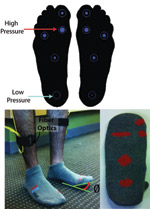The University of Arizona (UA), Tucson, Department of Surgery’s Southern Arizona Limb Salvage Alliance (SALSA), its Interdisciplinary Consortium on Advanced Motion Performance (iCAMP), and Hamad Medical, Doha, Qatar, have been awarded more than $2 million in research grants from the Qatar National Research Fund to study the use of wearable sensor technology incorporated in specially made socks. The socks are designed to be worn by individuals with diabetes who are at risk of forming foot ulcers that can lead to amputation and even death.

Photograph courtesy of the Arizona Health Sciences Center.
The socks are made from cutting-edge, intelligent textiles that use fiber optics and sensors to monitor three parameters, temperature, pressure, and joint angles in the feet, and alert medical professionals and wearers of the socks of any developing problems. UA patients at high risk of developing ulcers will be enrolled in the study, along with patients who are undergoing surgery of the foot or ankle to prevent ulcer formation.
“For the first time, we have the technology to measure all three parameters simultaneously and during daily activity to help us identify the area of the foot most likely to develop an ulcer,” said biomedical engineer Bijan Najafi, PhD, UA associate professor of surgery, and director of iCAMP.
A $1.1 million grant from the Qatar National Research Fund, in collaboration with Hamad Medical, will use the socks, SmartSox, to evaluate the risk of diabetic foot ulcers as well as assess the outcome of surgery on the foot. The study will establish if the socks can help predict when an ulcer is about to form, allowing medical professionals to intervene. A $300,000 project funded by Hamad Medical will use SmartSox technology to measure foot kinematics and kinetics to determine the best orthotic devices, braces, and shoe modifications to prevent the formation of foot ulcers. The data will help the footwear industry improve shoe design to prevent ulcers in people with diabetes and reduce falls in older adults. And an additional $1.1 million grant from Qatar National Research Fund for collaborative study among SALSA, Hamad Medical, and the University of Texas Southwestern University Medical Center, Dallas, will use electrical stimulator technology in socks with the aim of improving balance and gait in patients with diabetes and neuropathy.
Editor’s note: This story was adapted from materials provided by the Arizona Health Sciences Center.




